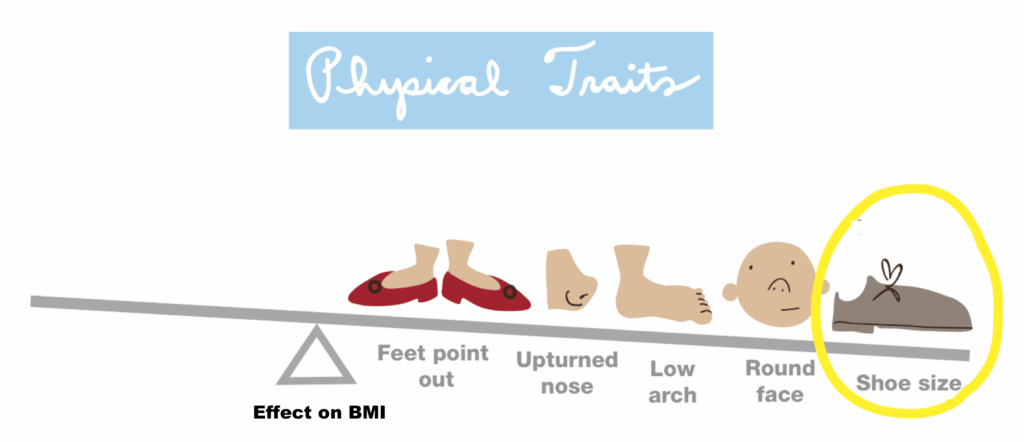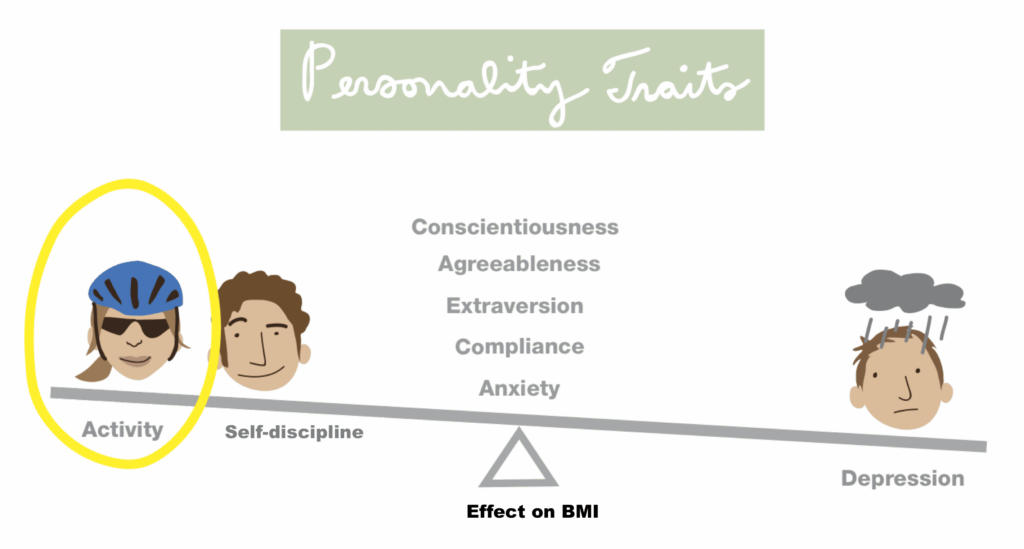Last week we quizzed our readers on traits associated with BMI among 23andMe’s customers. Congratulations to Suellen, the winner of the quiz! She got all three answers correct and will receive an Amazon gift card. So what were the correct answers? Read on…
Which physical trait is most associated with BMI? Shoe size.

Shoe size is very strongly correlated with BMI in 23andMe’s database. For each standard deviation increase in shoe size, BMI increases by 1.18 units. Put another way, the BMI of the bottom fifth of the shoe size distribution is 3.21 units lower on average than that of the top fifth. This corresponds to a difference of about 20 lbs in people who are 5’8” tall.
We’re really not sure what to make out of this one. Shoe size is also correlated with height but when we factored height into the analysis shoe size was still the most strongly correlated trait. Anecdotally, people’s shoe sizes can increase or decrease with weight gain and loss. It’s possible that people with wider feet may compensate by increasing their shoe size instead of choosing a wider shoe of the same size, or perhaps shoe size is a proxy for body frame, and people with larger shoe sizes have “bigger bones”. Have a theory? Add it to the comments below.
Having a round face, low arches, upturned nose, and feet that point outwards are also associated with BMI but to a lesser extent.
Which food item is most associated with BMI? Diet soda.

The surprise for us here was that ice cream consumption was not really correlated with BMI at all. On the other hand, people who drink diet soda five or more times a day have an average BMI nearly 5 units higher than those who never drink diet soda. Not to imply that we should all trade in that diet coke for a double hot fudge sundae — we don’t know whether drinking soda is a cause, a consequence, or just linked to something else that causes weight gain. These findings do, however, parallel that of a study conducted in Texas, in which normal weight individuals were followed for 8 years. People who reported drinking more diet soda gained more weight over those 8 years, suggesting that diet soda might actually lead more directly to weight gain.(1) But for now, the jury’s still out.
Some other foods were associated with BMI, too, including red meat, yogurt, and vegetables.
Which personality or behavior trait is most associated with BMI? Activity and depression.

These are less of a surprise. Activity is strongly correlated with BMI, and is no doubt due to the calorie burning benefits of exercise. The reverse may also be true — being overweight may itself decrease activity levels, creating a vicious cycle.
For depression, the arrow of causation seems to point in both directions. For example, a recent meta-analysis found that being overweight or obese increased the risk of developing depression, and having depression increased the risk of becoming obese.(2)
Having greater levels of self-discipline was correlated with lower BMI to a lesser extent, but aside from this we didn’t find a significant relationship between BMI and any other personality factors.
Check back soon for our next quiz and another chance to win!
(1) Fowler, SP, Williams, K, Resendez, RG, Hunt, KJ, Hazuda, HP, & Stern, MP. (2008). Fueling the Obesity Epidemic? Artificially Sweetened Beverage Use and Long-term Weight Gain. Epidemiology, 16(8): 1894-1900.
(2) Luppino, FS, de Wit, LM, Bouvy, PF, Stijnen, T, Cuijpers, P, Penninx, BWJH, Zitman, FG (2010). Overweight, Obesity, and Depression: A systematic review and meta-analysis of longitudinal studies. Arch Gen Psychiatry. 2010;67(3):220-229.



